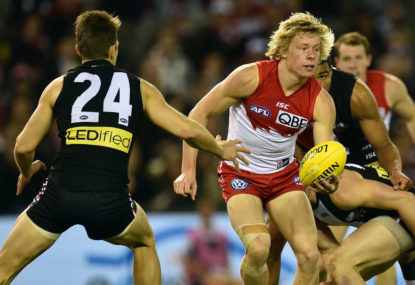Come the final siren on grand final day 2014, Swans fans were staring into the abyss, having been bamboozled and embarrassed by the greatest team of the modern, perhaps any, era.
On face value there was little wrong with Sydney’s list – there seemed an adequate quota of youth with a smattering of experience across the park.
Preparation could have hardly been better after trouncing North Melbourne at ANZ Stadium the week prior.
Yet there they were. The Bloods culture in tatters. Momentum from the Lance Franklin coup wasted. Apparently.
Nowadays, a club telling its supporters they must rebuild is like telling the match review panel you were ‘bracing for contact’, or telling the coach he has ‘the full support of the board’.
It’s a sign to book your holidays in September, or to go join a rugby league club.
Without necessarily admitting it, the Swans followed the rebuilding textbook. Premiership stars Adam Goodes, Rhyce Shaw and Nick Malceski cleared the way.
After teetering in 2015, many predicted a swan dive off the cliff. Playing right into his hands, John Longmire flicked the switch.
In the first round of this season, Sydney fielded its most inexperienced side since 1999.
But these kids were not run-of-the-mill wannabes straight out of the draft. Some were battle-hardened as a unit in the NEAFL, a footballing militia who simmered and thrived in the lower tier. Others fresh-faced and immensely talented.
Seven debutants have run out for Sydney to date in 2016, with the possibility of that number rising even higher by finals time.
Add to that the graduation of academy stars Isaac Heeney and Callum Mills. The younger of the two Mills looks like a 200-gamer in just his first year – watch for his name at the Rising Star. As for Heeney, he was born to play this game.
Stars Luke Parker and Dan Hannebery, not even 26 years old, rank among the competition’s elite.
Seemingly from the brink of irrelevance, the cygnets have stolen the spotlight.
Add to the list lesser-known Jake Lloyd, Dean Towers and Harry Cunningham, who have floated in and around the first team for years. These same players, originally thought of as investments, have come good on their potential earlier than expected. Each is forging a career from buying into the movement.
An overnight phenomenon this is not. Foundations of the new era at Sydney were set even before the 2014 finals. Coaches stuck by their guns when they told premiership heroes Ryan O’Keefe and Lewis Roberts-Thomson to go to the end of the line, despite the howls of disapproving fans.
Not all that played on that day in 2014 were ready, but they will be soon.
Sacrificing the twilight of their careers is perhaps the greatest service O’Keefe and Roberts-Thomson could have made for the club’s future.
The new wave are a reflection on the opportunities provided by old stars giving up their platform to shine. Sure, Goodes probably played on a season too long, but even the two-time Brownlow medallist was told to stand aside whenever Cunningham or Tom Mitchell earned his spot. This is a testament to Longmire’s team-first mentality.
Clinging to nostalgia can be catastrophic – look no further than Fremantle for what happens if you don’t prioritise long-term player development over familiar names that have over-stayed or under-performed.
Much feels new about Sydney. Such is the effect of entrusting the on-field and off-field brands to the next generation.
Former coach Paul Roos championed the need for the Swans to remain successful, and indeed relevant, in a sporting market as saturated as New South Wales.
Sydney missed the finals only once during Roos’ tenure as head coach, excluding his time as caretaker, a run that saw the club reach back-to-back grand finals in 2005 and ’06, and break a 72-year premiership drought.
The success of Greater Western Sydney has only compounded that need.
Rest assured the Swans are not rebuilding. They have been rebuilt, and showed the rest of the competition exactly how it should be done.
Premierships will not define the short-term success of this team. The fact they are even in the conversation, though, is a testament to coaches and the playing unit alike.
Don’t doubt Alastair Clarkson is marking down a succession plan of his own for when Luke Hodge, Sam Mitchell and co. hang up their boots.
But for now, if youth at the Swans was a stock, you’d sell your house and buy the lot.





























































































